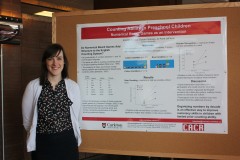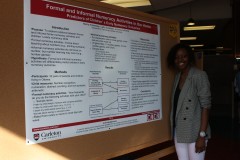Carleton April 13, 2012
Counting Ability in Preschool Children
Kristina Dunbar, Ozlem Cankaya, Jo-Anne LeFevre
The present study assessed the effectiveness of numerical board games on preschool children’s early numeracy skills. Fifty participants (M = 3:8 years) were assigned to one of three intervention groups: a linear condition, a row condition with numbers grouped by decade, and a control colour condition. For counters who could count to 12 or less (less- proficient counters), the row condition was the most beneficial in improving rote counting ability and number recognition. The intervention methods were no more effective at improving the counting ability or number recognition performance of counters who could count to 13 or more than the control condition. These findings suggest two main ideas: (1) preschool children benefit most from an intervention method that extends well beyond their pre-testing counting ability and number recognition ability and (2) an intervention method organized by decade into rows can further assist the numeracy skills of children. View Poster
Formal and informal numeracy activities in the home: Predictorsof children’s early numeracy outcomes
Mamy Kalambay, Carla Sowinski, Jo-Anne LeFevre
The present study was designed to explore the relation between home numeracy activities and children’s mathematical performance in preschool. A total of 32 parent-child dyads from six different day care centers in Ottawa participated in the study. Parents were asked to complete a questionnaire that included demographic questions, the frequency of involvement in home learning activities, and familiarity with a list of commercially available games suitable for preschool-age children as a measure of shared number game play. The children were visited in their daycares; during the visits, trained research assistants administered measures of spatial attention, vocabulary, abstract counting, number recognition, numeration and non-symbolic arithmetic. It was hypothesized that home numeracy activities could predict the mathematics performance of children. In addition it was expected that formal and informal numeracy activities would differentially predict children’s early numeracy outcomes. Consistent with these hypotheses, home numeracy experiences were related to children’s outcomes and different types of home numeracy activities had different relations with the math and number outcomes.

Kristina Dunbar presenting her poster. Winner of the People’s Choice Award.

Mamy Kalambay presenting her poster.
For more information on PURE 2012 click here to go to the Department of Psychology’s webpage.